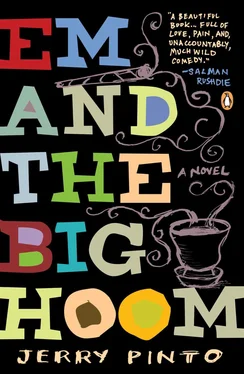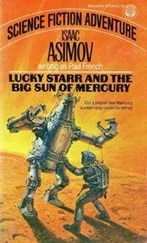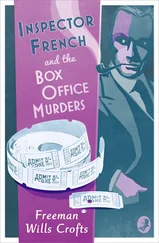Jerry Pinto - Em and the Big Hoom
Здесь есть возможность читать онлайн «Jerry Pinto - Em and the Big Hoom» весь текст электронной книги совершенно бесплатно (целиком полную версию без сокращений). В некоторых случаях можно слушать аудио, скачать через торрент в формате fb2 и присутствует краткое содержание. Год выпуска: 2014, Издательство: Penguin Books, Жанр: Современная проза, на английском языке. Описание произведения, (предисловие) а так же отзывы посетителей доступны на портале библиотеки ЛибКат.
- Название:Em and the Big Hoom
- Автор:
- Издательство:Penguin Books
- Жанр:
- Год:2014
- ISBN:нет данных
- Рейтинг книги:3 / 5. Голосов: 1
-
Избранное:Добавить в избранное
- Отзывы:
-
Ваша оценка:
- 60
- 1
- 2
- 3
- 4
- 5
Em and the Big Hoom: краткое содержание, описание и аннотация
Предлагаем к чтению аннотацию, описание, краткое содержание или предисловие (зависит от того, что написал сам автор книги «Em and the Big Hoom»). Если вы не нашли необходимую информацию о книге — напишите в комментариях, мы постараемся отыскать её.
Em and the Big Hoom — читать онлайн бесплатно полную книгу (весь текст) целиком
Ниже представлен текст книги, разбитый по страницам. Система сохранения места последней прочитанной страницы, позволяет с удобством читать онлайн бесплатно книгу «Em and the Big Hoom», без необходимости каждый раз заново искать на чём Вы остановились. Поставьте закладку, и сможете в любой момент перейти на страницу, на которой закончили чтение.
Интервал:
Закладка:
‘Me?’
‘Yes, you. Not that you’re going to get pregnant any which way you turn out. But if you do put a loaf in some poor girl’s oven, you will take her to a government place, you will announce that you are Mr and Mrs D’Souza —’
‘Why D’Souza?’
‘I don’t know. Some name. Any name. Not hers. And after it’s done you will take her somewhere to rest and relax and weep and you will stay with her until she can go home.’
‘You mean I’m not to tell her to jump down six stairs and give the baby to Our Lady?’
‘You are a wicked young man to laugh at an old lady’s guilt,’ said Em. But she was smiling too.
• • •
She was always Em to us. There may have been a time when we called her something ordinary like Mummy, or Ma, but I don’t remember. She was Em, and our father, sometimes, was The Big Hoom. Neither Susan nor I, the only persons who might ever care to investigate the matter, can decide how those names came about, though we’ve tried (‘Em must mean M for Mother’ and ‘Maybe it’s because he made “hoom” sounds when we asked him something’). On certain days we called her Doogles, or The Horse, or other such names that sprang from some subterranean source and vanished equally quickly. Otherwise, she was Em, and most of the time she was Em with an exclamation mark.
Once, by mistake, I called her Mater. I got it out of a Richie Rich comic. The very rich, very snobby Mayda Munny used the word to address her mother. I should have known that I would not get away with something so precious, but I was nine or ten years old and did not know what precious meant. Em peered at me for a moment, pulling deeply on her beedi. (She smoked beedis because they were cheap, she said, and because once you’d started down the beedi road, you could never find your way back to the mild taste of cigarettes. The Big Hoom rarely came home from work in the evenings with sweets for us when we were children, but he never forgot the two bundles of Ganesh Chhaap Beedi.)
‘Mater,’ she said, and her eyes shone behind the curls of smoke. ‘Yes, I suppose I am. I did do it, didn’t I? And here you stand, living proof.’
I think I blushed. She roared, a happy manic laugh.
‘I thought you boys knew everything about the cock and cunt business!’
‘We do,’ I said, lamely, terrified of where the conversation was going.
‘So what did you think, both of you were products of the Immaculate Conception? Gosh, you couldn’t keep us out of bed in those first years.’
‘Em!’
‘What? Are you feeling all Oedipal-Shmeedipal then?’
‘What’s Oedipal?’
Em loved a good story. She was off.
‘Ick,’ I said when Oedipus wandered off, his eyes bleeding and his future uncertain, escorted by his daughter who was also his sister.
‘Well you may say “Ick”,’ said Em. ‘But that’s what Freud says every boy wants to do to his mother. Ick, I say to Mr Freud. He must have been odd, even for an Austrian. Not that I’m racist, but why would they have a navy when they’re landlocked?’
‘Mr Freud was in the navy?’ I asked, confused.
‘No, silly, I’m talking about The Sound of Music .’
The Big Hoom came into the bedroom.
‘You’re telling the boy about?’
‘The psychoanalytic movement,’ said Em, her voice slightly defiant.
‘Have you got past the id, the ego and the superego?’ he asked pleasantly.
‘I should have started at that end, shouldn’t I?’
‘At what end did you start?’
‘Oh, I was telling him about the Oedipus Complex.’
The Big Hoom said nothing. He did nothing. He looked at her. She went into a tizzy.
‘It’s knowledge, knowledge is good, it will help, knowledge always helps,’ she said. She was attempting logic. But she was miserable. It was only later that I came to understand why she never used her condition as a refuge: it would have violated her sense of fair play. The Big Hoom let her stew for a bit and then he nodded. He opened The Hamlyn Children’s Encyclopaedia , a book that I refused to read because it had been given to Susan as a birthday present, and slowly led me through the facts of life.
This might have been enough, but my mind was already locked on to what Em had told me. ‘Why do boys want to do that with their mothers?’ I asked.
A lesser man might have run shrieking from the question, or told his son to shut up. The Big Hoom taught me the word hypothesis, instead, and explained a little bit about Freud and tried to clear things up. Finally, he set me to making words out of ‘hypothesis’ and promised me ten paise for every word after the twentieth.
I loved the word hypothesis. It sounded adult and beautifully alien. I had never heard anything like it before. I wanted more words like it. I felt, instinctively, that when you had enough words like hypothesis, you would be able to deal with the world. I wasn’t sure I would ever be able to deal with the world. It seemed too big and demanding and there wasn’t a fixed syllabus.
I didn’t know how to deal with what we were as a family, either. I didn’t really know what we were as a family. I only knew that something was wrong with all of us and that it had something to do with my mother and her nerves.
‘What are nerves?’ I had asked The Big Hoom once. I didn’t really want to know but a question was a good way to get him to pay attention to me. He put down his newspaper and took me into the gallery. Outside, wires snaked and writhed between the buildings of our housing colony. He pointed to them.
‘What are those?’
I hated these moments. I wanted to be told, I did not want to be asked.
‘Wires,’ I said.
‘What do wires do?’
‘Electricity?’
‘Yes, they carry electric current,’ he said. ‘Nerves do that inside the body.’
Thoughts, like electric currents, and inside my mother’s head they ran uncontrolled — flashing and sizzling. I carried that image with me through my childhood for what ailed my mother and took her to hospital, sometimes every few months. Then she gave me another.
• • •
She was in Ward 33 again, lying in bed, a bed with a dark green sheet and a view of the outside. We could both see a man and a woman getting out of a taxi. They were young and stood for a while, as if hesitating, in front of the hospital. Then the man took the woman’s hand in his and they walked into the hospital and we lost them.
‘That’s why Indian women fall ill,’ Em said. ‘So that their husbands will hold their hands.’
‘Is that why you’re here?’
I wanted to bite my tongue. I wanted to whiz around the world, my red cape flying, and turn time back so that I could choose not to make that remark. But Em, being Em, was already replying.
‘I don’t know, Baba, I don’t know why. It’s a tap somewhere. It opened when you were born.’
I was repaid in pain, a sharp thing.
‘I loved you. And before you I loved Susan, the warmth of her and the smiles and the tiny toes and the miracle of her fingernails and the way her scrapes would fade within the day as she healed and grew. I loved the way her face lit up when she saw me and the way she nursed. But after you came along…’
She turned to the window again. An ambulance turned in, lazily, in the way of the city’s ambulances. Inured to traffic, unconcerned by mortality, unimpressed by anyone’s urgency, the ambulance driver stopped to light a beedi before jumping out of the cab. We watched together as someone inside opened the doors and two young men leapt out and tried to wrest a stretcher from within.
‘Was it like that?’ she asked. She had forgotten how she got to the hospital.
‘No,’ I said. ‘You came in a taxi.’
Читать дальшеИнтервал:
Закладка:
Похожие книги на «Em and the Big Hoom»
Представляем Вашему вниманию похожие книги на «Em and the Big Hoom» списком для выбора. Мы отобрали схожую по названию и смыслу литературу в надежде предоставить читателям больше вариантов отыскать новые, интересные, ещё непрочитанные произведения.
Обсуждение, отзывы о книге «Em and the Big Hoom» и просто собственные мнения читателей. Оставьте ваши комментарии, напишите, что Вы думаете о произведении, его смысле или главных героях. Укажите что конкретно понравилось, а что нет, и почему Вы так считаете.











